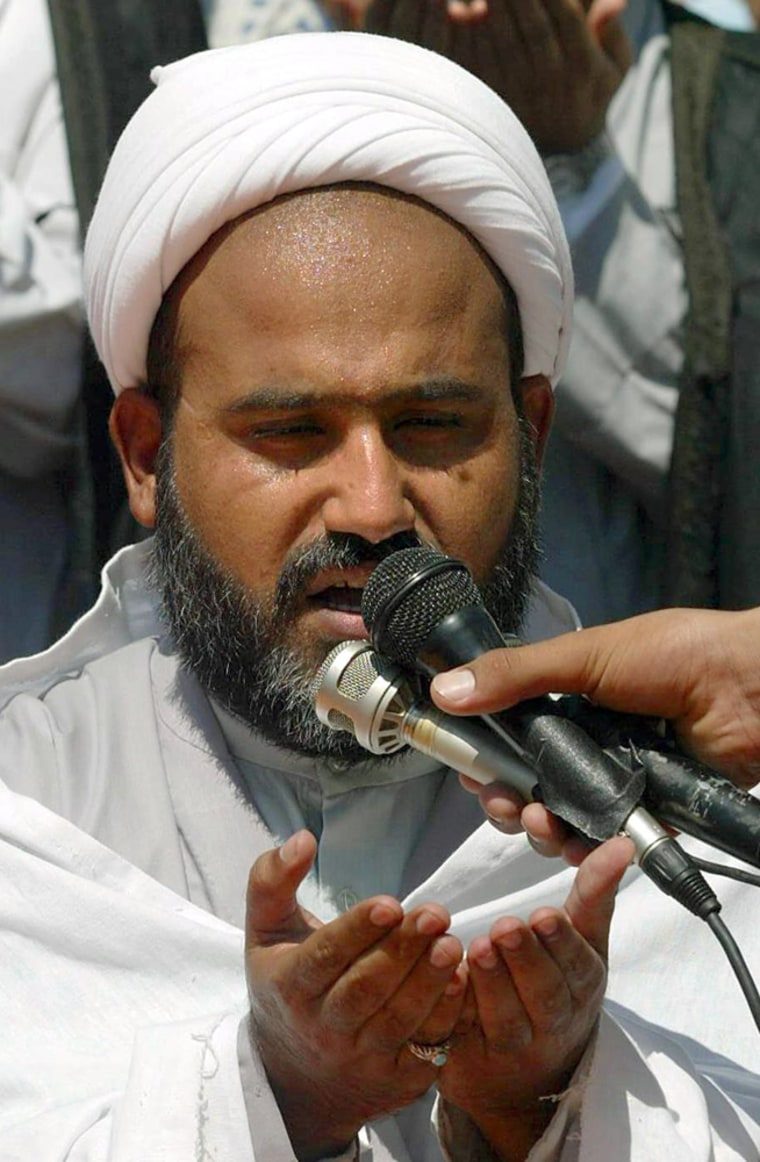U.S. and Iraqi forces arrested one of Muqtada al-Sadr’s top aides Friday in Baghdad, his office said, as pressure increased on the radical Shiite cleric’s militia ahead of a planned security crackdown in the capital.
An adviser to Prime Minister Nouri al-Maliki, however, denied the government knew in advance about the raid, in which Sheik Abdul-Hadi al-Darraji was captured and said the detention was not part of the new operation aimed at quelling Baghdad’s sectarian violence.
“There was no coordination with the Iraqi political leadership and this arrest was not part of the new security plan,” the adviser, Sadiq al-Rikabi, told Al-Arabiya. “Coordination with the Iraqi political leadership is needed before conducting such operations that draw popular reactions.”
His comments reflected the differences between the United States and Iraq’s Shiite-dominated government on how to deal with the Shiite militias that have been blamed for much of the recent violence, particularly the killings that have left dozens of tortured and bullet-riddled bodies daily in Baghdad and elsewhere.
The raid came as Defense Secretary Robert Gates began his second trip to Iraq in less than a month, arriving in the southern city of Basra to consult with British and other allied commanders.
Al-Darraji was captured and his guard was killed in a raid on a mosque complex in eastern Baghdad, according to senior officials with the cleric’s movement.
The U.S. military said special Iraqi army forces operating with coalition advisers captured a high-level, illegal armed group leader in Baladiyat, an eastern neighborhood near al-Sadr’s stronghold. It did not identify the detainee, but said two other suspects were detained by Iraqi forces for questioning.
It said the main suspect was involved in the kidnapping, torture and murder of civilians, as well as the assassination of Iraqi security forces and government officials.
Release demanded
But al-Sadr’s office said al-Darraji was the movement’s media director in Baghdad and demanded his immediate release.
“We strongly condemn this cowardly act,” said Sheik Abdul-Zahra al-Suweiadi, a senior al-Sadr aide in Baghdad.
Al-Sadr said in an interview with an Italian newspaper published Friday that the crackdown had already begun and that 400 of his men had been arrested, confirming an earlier statement by al-Maliki. La Repubblica also quoted the cleric as saying he fears for his life and stays constantly on the move.
Al-Sadr told the newspaper his militias would not fight back during the Muslim holy month of Muharram, saying it was against the faith to kill at that time. Muharram starts Friday for Sunnis and Saturday for Shiites.
“Let them kill us. For a true believer there is no better moment than this to die: Heaven is ensured,” he was quoted as saying. “After Muharram, we’ll see.”
Al-Sadr said he is being targeted.
“For this reason, I have moved my family to a secure location. I even have had a will drawn up, and I move continuously in a way that only few can know where I am,” he was quoted as saying.
Militia commanders have said the Shiite prime minister has stopped protecting the fighters under pressure from Washington and have described pinpoint raids in which at least five top commanders of similar standing were captured or killed in recent months.
Al-Maliki has pledged to rein in the Shiite militias as well as Sunni insurgents in the security operation. His reluctance to confront the Mahdi Army of al-Sadr, his political backer, contributed to the failure of previous efforts to stem sectarian violence.
But al-Rikabi stressed that “the new security plan does not target a specific militia, it targets everyone practicing killing and terrorism against civilians, whether Sunnis or Shiites.”
Friday violence
At least nine people were killed or found dead Friday, including a man working for the Ministry of Tourism and Archaeology Affairs who was shot to death near his home in a predominantly Sunni neighborhood in western Baghdad. Gunmen also attacked a Shiite mosque in southern Baghdad, killing two guards, then detonating explosives to damage the building.
A roadside bomb killed one U.S. soldier and wounded three in an attack on a patrol that was escorting a convoy in northwestern Baghdad, the military said.
In another development, a leading Sunni insurgent and 10 of his deputies also were captured in a raid in Balad, 50 miles north of Baghdad, according to state-run Iraqiya TV station, which cited an unidentified Interior Ministry official. The report, which could not immediately be confirmed, said Tami al-Majmaie was a leading commander of the Omar Brigades.
The U.S. military accused the main suspect captured Friday in Baghdad of having ties with the commanders of so-called death squads, including Abu Diraa, a Shiite militia leader who has gained a reputation for his brutality.
Al-Suweiadi did not give more details, but another official in al-Sadr’s office said al-Darraji was captured during a 2 a.m. raid on a mosque in Baladiyat, less than a mile from a U.S. base.
The official and an Iraqi police officer, who spoke on condition of anonymity because of security concerns, also said one of the mosque’s guards was killed in a firefight during the raid that damaged the mosque walls, while four other people who were with the sheik were arrested.
Abdul-Razzaq al-Nidawi, an al-Sadr aide in the Shiite holy city of Najaf, demanded that al-Darraji and other detainees from the cleric’s movement be released and called for demonstrations after the weekly Friday prayer services.
“America is playing with fire and our patience is beginning to fade,” he said. “This savage barbarian act will not pass peacefully.”
Gates, who met earlier with the leaders of Saudi Arabia and Qatar, said they had expressed concern about whether al-Maliki can deliver on promises to rein in the violence and “quite frankly, these are reservations that have been expressed in Washington, and we will be watching.”
Highlighting the challenges, a rocket struck a British military base late Thursday in Basra, wounding six soldiers, spokeswoman Capt. Katie Brown said, hours before Gates arrived.
